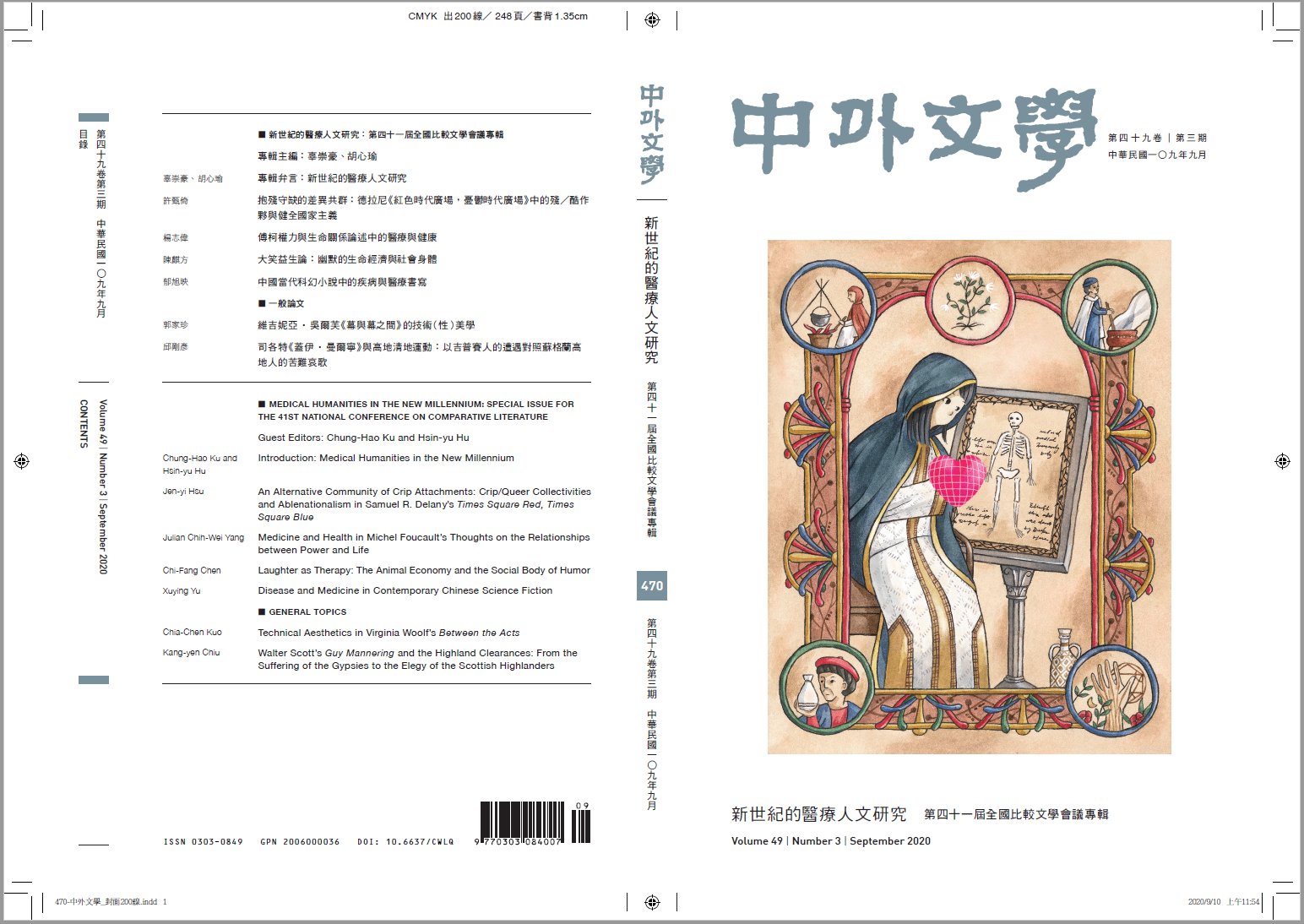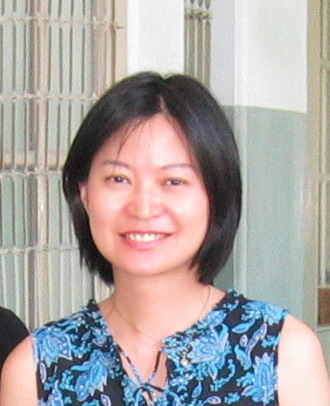第四十九卷 第三期 總470 中華民國109年9月
Vol. 49 No. 3 Sept. 2020

《中外文學》九月號起由李鴻瓊副教授接任總編輯,本期推出由辜崇豪與胡心瑜共同主編的《新世紀的醫療人文研究:第四十一屆全國比較文學會議專輯》,收錄了四篇精彩的專輯論文,另外也收錄了兩篇一般論文。專輯論文部分,許甄倚以黑人男同志作家德拉尼(Samuel R. Delany)的回憶錄《紅色時代廣場,憂鬱時代廣場》(Times Square Red, Times Square Blue)為例,援用障礙研究與酷兒理論,探討「殘/酷作夥」與「健全國家主義」之相關議題;楊志偉以傅柯(Michel Foucault)的哲學思想為著眼點,檢視醫療、健康與相關概念在其探討權力與生命關係論述中所扮演的角色;陳麒方追溯大笑養生思想至十八世紀的「生命經濟」論述,以史騰(Laurence Sterne)的《項狄傳》(The Life and Opinions of Tristram Shandy, Gentleman)與《憨弗雷‧克林克出遊記》(The Expedition of Humphry Clinker)為例,主張「大笑益生論」試圖將個體健康轉譯為社會健康,成為文學文化市場中自我指涉的商品;郁旭映則以劉興詩〈鄉村醫生〉、葉永烈〈愛之病〉、王晉康《生死平衡》與陳楸帆〈未來病史〉等四部醫療科幻小說為主要閱讀文本,試圖在中國當代科幻小說中梳理出一段疾病與醫療史,並檢視人類主體建構方式如何發生改變。一般論文部分,郭家珍從德希達(Jacques Derrida)閱讀佛洛伊德(Sigmund Freud)出發,討論吳爾芙(Virginia Woolf)《幕與幕之間》(Between the Acts)的書寫、郵寄、檔案等三大技術;邱剛彥則重探司各特(Walter Scott)的小說《蓋伊‧曼爾寧》(Guy Mannering),認為小說蘊含了作家對蘇格蘭高地清地運動之批判,並以吉普賽人暗喻蘇格蘭高地人所遭受的迫害。
中外文學九月號目錄
Contents
新世紀的醫療人文研究:第四十一屆全國比較文學會議專輯
MEDICAL HUMANITIES IN THE NEW MILLENNIUM: SPECIAL ISSUE FOR THE 41ST NATIONAL CONFERENCE ON COMPARATIVE LITERATURE
-
辜崇豪、胡心瑜(專輯主編)╱專輯弁言:新世紀的醫療人文研究
Chung-Hao Ku and Hsin-yu Hu (Guest Editors)╱Introduction: Medical Humanities in the New Millennium
許甄倚╱抱殘守缺的差異共群:德拉尼《紅色時代廣場,憂鬱時代廣場》中的殘/酷作夥與 健全國家主義
抱殘守缺的差異共群
德拉尼《紅色時代廣場,憂鬱時代廣場》中的殘/酷作夥與健全國家主義
許甄倚*
摘要
以科幻小說寫作著稱的黑人男同志作家山謬‧ 德拉尼(1942-),在回憶錄《紅色時代廣場,憂鬱時代廣場》中,以懷舊方式探索紐約市仕紳化前的另類共群。九○年代在朱利安尼市長主導的新自由主義都市規劃下,時代廣場原本蓬勃的色情產業快速凋零。當中的族裔、階級、職業、性文化等多元性消失殆盡,取代的是迎合中產階級消費者及觀光客的購物商圈。本論文援用障礙研究與酷兒理論,分析回憶錄中的「殘/酷」交織性,藉由波茵的「反思型懷舊」、卡妃爾的「殘時間」、米切爾與石耐德的「健全國家主義」、「新自由主義生命政治」等概念,凸顯障礙者與貧窮酷兒的性權是如何受到強迫健全主義及仕紳化婚家主義剝奪;並批判新自由主義定義下的社會融入模式是如何犧牲大多數消費不起的污名人口,只讓少數過去被邊緣化的人口享有躋身常模的特權。本文同時也探討主流所謂的正常或健全是如何倚賴排他邏輯來合法化常模主體的
存在與幸福感,而此與不公義的合謀即舒蔓所謂的「仕紳化快樂」。
◎關鍵詞:山謬‧ 德拉尼,仕紳化,性,身心障礙,酷兒,時代廣場,新自由主義,健全國家主義,生命政治
★ 國立東華大學英美語文學系教授。
Jen-yi Hsu╱An Alternative Community of Crip Attachments: Crip/Queer Collectivities and Ablenationalism in Samuel R. Delany’s Times Square Red, Times Square Blue
An Alternative Community of Crip Attachments
Crip/Queer Collectivities and Ablenationalism in Samuel R. Delany’s Times Square Red, Times Square Blue
Jen-yi Hsu*
Abstract
As a renowned science fiction writer, Samuel R. Delany, in his 1999 memoir Times Square Red, Times Square Blue, looks back nostalgically at the world that has vanished after New York City’s gentrification. In the 1990s, Mayor Giuliani’s neoliberal urban redevelopment wiped out Times Square’s sex theaters and the area’s ethnic, racial, sexual, class, and vocational diversity. Diversities were replaced by homogeneity, characterized by shops that catered to middle-class consumers and tourists. This paper employs disability and queer studies to analyze the memoir’s “crip/queer” intersections. Svetlana Boym’s “reflective nostalgia,” Alison Kafer’s “crip time,” David Mitchell and Sharon Snyder’s “ablenationalism” and “neoliberal biopolitics” are used as theoretical tools to highlight the dispossession of crip/queer sexual access under the regime of compulsory able-bodiedness and gentrified heteronormativity. This paper undertakes analyses of the ways in which neoliberal models of social integration allow some members of previously marginalized groups to be included under normative values and how this inclusionism sacrifices the majority of crip/queer citizens living in poverty. The paper also explores how normalcy relies on the logic of exclusion to legitimize its existence; this collusion with injustice is Sarah Schulman so-called “gentrified happiness.”
◎Keywords: Samuel R. Delany, gentrification, sex, disability, queer, Times Square, neoliberalism, ablenationalism, biopolitics
★Professor, Department of English, National Dong Hwa University.
楊志偉╱傅柯權力與生命關係論述中的醫療與健康
傅柯權力與生命關係論述中的醫療與健康
楊志偉*
摘要
◎關鍵詞:傅柯,醫療,健康,規訓權力,生命政治,自我照顧,權力關係,瘋狂
★國立臺東大學通識教育中心助理教授。
Julian Chih-Wei Yang╱Medicine and Health in Michel Foucault’s Thoughts on the Relationships between Power and Life
Medicine and Health in Michel Foucault’s Thoughts on the Relationships between
Power and Life
Julian Chih-Wei Yang*
Abstract
◎Keywords: Michel Foucault, medicine, health, disciplinary power, biopolitics, care of the self, power relation, madness
★Assistant Professor, Center for General Education, National Taitung University.
陳麒方╱大笑益生論:幽默的生命經濟與社會身體
大笑益生論
幽默的生命經濟與社會身體
陳麒方*
摘要
今日風行於流行文化的「笑療法」,配合人本主義意識形態的思想遺產,已成為一個跨領域的文化工業。本文耙梳大笑養生思想的歷史文化起源,探討十八世紀生理論述如何為一個新興文化典範立基。在此體系中,「生命經濟」提供理解大笑行為的理路:藉由大笑引發的身體運動排除廢物、加速身體循環,並治療各種心疾,以促進健康。以此為基礎,「大笑益生論」試圖將個體健康平順地轉譯為社會健康,並成為文學和文化市場中自我指涉的商品:它將喜劇中反經濟的消耗、混亂轉為開懷的資源,規避其複雜社會衝突的政治文本。本文將閱讀《項狄傳》與《憨弗雷‧ 克林克出遊記》以探究是類論述在文學語言的介質中所隱含的反諷與難題。
◎關鍵詞:大笑,生命經濟,社會身體,政體,人本主義,《項狄傳》,《憨弗雷‧克林克出遊記》
★國立清華大學通識教育中心暨語文中心兼任助理教授。
Chi-Fang Chen╱Laughter as Therapy : The Animal Economy and the Social Body of Humor
Laughter as Therapy
The Animal Economy and the Social Body of Humor
Chi-Fang Chen*
Abstract
Laughter therapy, assisted by humanist ideologies, has become a massive cultural industry. This article traces the cultural origins of the idea of medicinal laughter in the eighteenth century, addressing the ways in which physiological discourse shaped an emergent cultural paradigm. In such system, “animal economy” laid a foundation for conceiving laughter in terms of bodily movement and circulation that were believed to promote physical and mental health. On this basis, laughter as therapy sought a smooth translation from personal health to social health. In this sense, it can be seen as a solution to the problems of comedy, transforming the waste and chaos in it into resources of mirth, while complex political texts of social conflict were sidestepped. In this way, laughter’s status as a self-referential commodity was established in the literary and cultural market. This article reads The Life and Opinions of Tristram Shandy and The Expedition of Humphry Clinker to investigate the ironies and conundrums of such discourses in the medium of literary language.
◎Keywords: laughter, animal economy, social body, body politic, humanism, Tristram Shandy, Humphry Clinker
★Adjunct Assistant Professor, Center for General Education and Center of Language Education, National Tsing Hua University.
郁旭映╱中國當代科幻小說中的疾病與醫療書寫
中國當代科幻小說中的疾病與醫療書寫
郁旭映*
摘要
科幻小說中,疾病及醫療的書寫差異折射出現代性想像所經歷的變遷。本文擬以四部醫療科幻──劉興詩〈鄉村醫生〉(1963)、葉永烈〈愛之病〉(1986)、王晉康《生死平衡》(1997)和陳楸帆〈未來病史〉(2015)──為主要例子,從中國當代科幻小說中梳理出一段粗略的疾病與醫療史。首先,「疾病」經歷了隱喻化過程:從普通的常見病,到「資本主義」特殊病,到象徵「文明衝突」的流行性病毒,再到後人類的身心變異。相應地,「醫病」的態度經歷變遷:從技術樂觀主義,到醫學人道主義,到對西方現代醫學的挑戰,再到以後人類「診斷」人類。更深層意義上,疾病敘事的變化反映了當代科幻小說中現代性想像的不同階段:社會主義現代性;從社會主義現代性到西方現代性的過渡;對於西方現代性的反思和替代性方案的尋找;以後人類角度超越現代性。在此過程中,人的主體建構方式亦發生改變:從集體主義主體性,到帶有意識形態標籤的個人主體性,到帶有文化特徵的個人主體性,再到後人類主體性的建構。
◎關鍵詞:現代性,技術樂觀主義,醫學人道主義,文明的衝突,後人類,主體性
★香港公開大學人文社會科學院助理教授。
Xuying Yu╱Disease and Medicine in Contemporary Chinese Science Fictionr
Disease and Medicine in Contemporary Chinese Science Fiction
Xuying Yu*
Abstract
Through an analysis of four works, this study delineates the history of disease and medicine in contemporary Chinese science fiction. Specifically, Liu Xingshi’s “The Village Doctor” (1963) echoes Maoist public health policies with scientific utopianism; Ye Yonglie’s “Illness of Love” (1986) expresses an anxiety about the infection of a “capitalist disease” in the era of opening up; Wang Jinkang’s Balance between Life and Death (1997) imagines the challenge of Western medicine within the framework of cultural clash; and Chen Qiufan’s “Future Disease” (2015) exposes how technology transforms human subjectivity to posthuman subjectivity. As illness is metaphorized from physical to ideological and cultural, the medical response transforms from technological optimism to medical humanitarianism, then to the challenging of modern Western medicine, and finally to the deconstruction of the “human itself. Such transformation reflects the four stages of the Chinese discourse of modernity: socialist modernity, the transition from socialist modernity to Western modernity, the critique of Western modernity and the search for an alternative, and the transcendence of modernity in the posthuman future. This process also reflects the changing representation of human subjectivity, i.e., from collective subjectivity to individual subjectivity with an ideological label, to culturalist subjectivity, and finally to posthuman subjectivity.
◎Keywords: modernity, technological optimism, medical humanism, clash of civilizations, posthuman, subjectivity
★Assistant Professor, School of Arts and Social Sciences, The Open University of Hong Kong.
一般論文
General Topics
郭家珍╱維吉妮亞‧ 吳爾芙《幕與幕之間》的技術 (性)美學
維吉妮亞‧ 吳爾芙《幕與幕之間》的技術(性)美學
郭家珍*
摘要
本篇論文從德希達閱讀佛洛伊德出發,討論吳爾芙的《幕與幕之間》如何呈現了書寫技術(性)、郵寄技術(性)與檔案技術(性)。《幕與幕之間》雖為村莊居民聚在一起觀賞英國歷史劇的小說,我們卻可觀察到上述眾多的技術(性)。首先,書寫作為痕跡,藉由括弧將自己敘述其內。其次,郵寄技術物(信件、報紙、帳單)和遠端傳輸、運輸技術物(火車、汽車、腳踏車、飛機、電話、教堂的鐘),呈現了觀眾四散而去的意識與記憶。最後,建檔的欲望(二戰前夕再現英國歷史以凝聚社群),和檔案摧毀自身的欲望(歷史劇無法呈現單一意義與最終意指),讓《幕與幕之間》實踐了德希達式的檔案技術(性);也讓吳爾芙這部關於舞台的書寫,更深刻地帶出德希達式的書寫舞台。
◎關鍵詞:佛洛伊德,德希達,吳爾芙,《幕與幕之間》,技術,技術性
★淡江大學英文系副教授。
Chia-Chen Kuo╱Technical Aesthetics in Virginia Woolf’s Between the Acts
Technical Aesthetics in Virginia Woolf’s Between the Acts
Chia-Chen Kuo*
Abstract
This paper starts with Jacques Derrida’s reading of Sigmund Freud, and argues that although Virginia Woolf ’s Between the Acts describes how local citizens gather together to enjoy a pageant play, three important techniques—writing, postal and archival—along with their technical objects frame this fiction. Writing as a technique weaves itself into the text and numerous technical objects used in the postal system (such as letters, newspapers and bills), while tele-communication and long-distance transportation (such as trains, cars, bicycles, airplanes, telephones and bells) render present the dispersed consciousness and recollection of the audience. Between the Acts further practices the Derridean archival technicity: the archival desire of this pageant play to represent English history before the Second World War is in a tug of war with the self-destructive desire within this textual archive so that this pageant play or Woolf ’s fiction cannot convey a unified meaning. By reading via Derrida’s concepts of the scene of writing, this paper expounds on how Between the Acts as Woolf ’s writing of scenes renders present the said three important techniques.
◎Keywords: Sigmund Freud, Jacques Derrida, Virginia Woolf, Between the Acts, technics, technicity
★Associate Professor, Department of English, Tamkang University.
邱剛彥╱司各特《蓋伊‧ 曼爾寧》與高地清地運動:以吉普賽人的遭遇對照蘇格蘭高地人的苦難哀歌
司各特《蓋伊‧ 曼爾寧》與高地清地運動
以吉普賽人的遭遇對照蘇格蘭高地人的苦難哀歌
邱剛彥*
摘要
瓦爾特‧ 司各特創作的絕大多數小說,皆以知名的歷史事件做為故事的背景,只有極少數,例如本文關注的《蓋伊‧ 曼爾寧》,指向當代的社會議題。《蓋伊‧ 曼爾寧》講述一群世代與蘇格蘭民眾相互依存的吉普賽人,遭到地主以社會進步之名,被迫離開家園的事件。然而上述事件所暗指的,或許是與司各特同時期,發生在蘇格蘭高地的清地運動。十八世紀中葉開始,數以萬計的高地佃農,遭地主驅離世代賴以為生的土地,取而代之的是具有更高經濟價值的黑面羊。司各特藉由這部小說批判社會現代化背離了蘇格蘭舊有的傳統,也藉著這群以梅格‧ 梅里莉絲為首的吉普賽人暗喻高地人遭受本國政府如同殖民一般的對待。《蓋伊‧ 曼爾寧》所撰寫的,是蘇格蘭的百年創傷史,此一創傷史直至今日都是研究蘇格蘭近代歷史與文學不可或缺的珍貴材料。
◎關鍵詞:司各特,《蓋伊‧ 曼爾寧》,蘇格蘭高地清地運動,吉普賽人
★ 國立陽明大學人文與社會教育中心助理教授。
Kang-yen Chiu╱Walter Scott’s Guy Mannering and the Highland Clearances: From the Suffering of the Gypsies to the Elegy of the Scottish Highlanders
Walter Scott’s Guy Mannering and the Highland Clearances
From the Suffering of the Gypsies to the Elegy of the Scottish Highlanders
Kang-yen Chiu*
Abstract
Many Walter Scott’s works are historical novels. However, Guy Mannering, the focus of this paper, is among the few of Scott’s novels that deal with contemporary social issues. A main episode of the novel concerns the expulsion of gypsies whose leader is Meg Merrilies. The novel reflects on the widespread displacement of the agricultural poor particularly in the eighteenth and nineteenth centuries in the name of improvement. In the Highlands of Scotland those events are now well remembered as the “Highland Clearances. This process was viewed as the inexorable progress of the society, which not only altered traditional social structures but also threatened the perceived core values of Scottish society. It is this paper’s intention to reveal the significance of Meg Merrilies, who gives voice to those who are subject to the hegemony of the ruling classes. Embodying the subaltern in society, Merrilies’ story is highly suggestive of colonial deeds at home and abroad although she is often regarded as having a mere subordinate role in this novel. Guy Mannering records the trauma that rural Scotland suffered from agricultural improvement. This history is an essential and pertinent episode to those who intend to study the modern history and literature of Scotland.
◎Keywords: Walter Scott, Guy Mannering, Highland Clearances, Gypsies
★Assistant Professor, Education Center for Humanities and Social Sciences, National Yang Ming University.
9月號《中外文學》發行點(由於誠品訂單每期浮動,讀者前往購買前請自行與店家確認)

